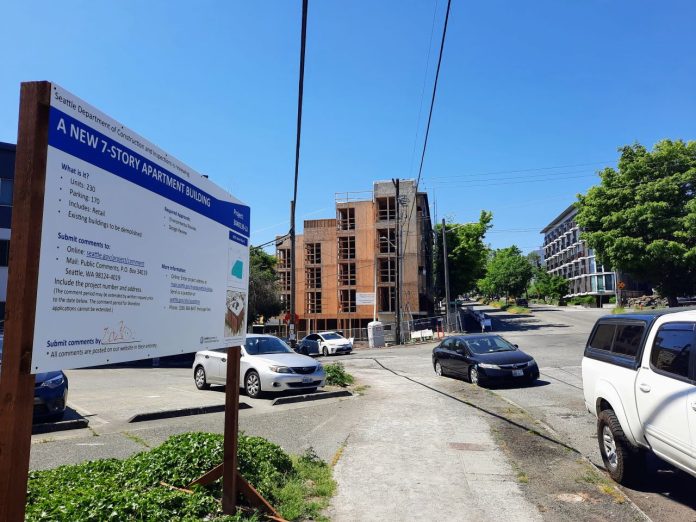
Tell your councilmember to vote against the transportation impact fee.
On Tuesday, amidst a deep housing affordability crisis, the outgoing Seattle City Council is setting the stage for a new fee to make building homes in Seattle even more expensive.
This homebuilder fee — a “transportation impact fee” — threatens to hamper housing production, reduce funding for affordable housing, and deter development in areas with frequent transit service and good access to jobs and amenities. While we need more investment in Seattle’s multimodal transportation infrastructure, this is the wrong time and the wrong place for transportation impact fees on new development.
Housing starts are down, impact fees could make it worse
The timing of the proposed transportation impact fees could not be worse. With high interest rates and construction costs, home-builders are already finding it nearly impossible to make new housing projects financially feasible. While the skyline is still filled with cranes from developments started years ago, the city’s data shows applications for new apartment construction permits have plummeted, down from 11,200 between January and September of 2020 to just 2,600 between that same timeframe this year.
Adding another fee on top of these challenges will limit new housing supply, exacerbating our existing shortage of all types of homes. Economic analysis commissioned by the Mobility Coalition projects that transportation impact fees imposed under the proposed amendment would reduce housing production by 15-17%. This reduction will worsen the housing shortage that fuels rising rents, displacement, and homelessness.
To be clear, we believe transportation impact fees can be a helpful tool for suburban and rural jurisdictions to pay for infrastructure needs from new development, when there’s no conflict with other critical public goals. That is not the case in Seattle. Building homes close to jobs, amenities, and services reduces people’s need to drive long distances. It allows more people to get around by walking, transit, or cycling. Transportation impact fees risk displacing growth to outlying areas with fewer transportation options, increasing reliance on cars, adding to traffic congestion, and forcing our region to spend millions more in road and highway infrastructure to compensate.
Uncertain revenue with blowback potential
Finally, by disincentivizing development activity, any revenue generated by potential transportation impact fees may be offset by losses from other city revenue sources. The Real Estate Excise Tax (REET) is one of the major local sources of funding for transportation, and collections are driven by property sales and new development. REET revenues have declined precipitously and are projected to decline 10% more in 2023.
Construction also contributes to our sales and B&O tax revenues, both of which are predicted to continue to decline due to the industry-wide slowdown. And because of Mandatory Housing Affordability — which requires private developers to either include affordable apartments in new buildings or pay a fee to the Office of Housing — slowdowns in development activity will directly reduce funding available for affordable housing for low-income families.
Seattle needs more homes to address our affordability crisis. Instead of adopting another fee that will add costs to home-builders and worsen the housing shortage, the Council should lead with the mayor on ways to help the city recover from the pandemic and catalyze the additional economic activity and housing production we need.
We need to build on the resounding success of the Seattle Housing Levy renewal by increasing all sources of funding for affordable housing, streamlining permitting, and investing in the Downtown Activation Plan. Furthermore, the future city council should align discussions on funding transportation infrastructure projects with an existing tool, the nine-year transportation levy, set for renewal next year. By adopting a holistic approach and fostering collaboration, we can make meaningful strides in addressing the housing affordability crisis while supporting sustainable transportation investments.
Take action!
You can reach your councilmembers by emailing them at council@seattle.gov or testifying at the City Council meeting at 2pm Tuesday November 21 either in-person or electronically. The sign-up form opens at noon. It’s a packed agenda with impact fees pretty far down the list, so the public comment session may go late in the meeting
This article is a cross-post from The Stranger, where it originally appeared.



